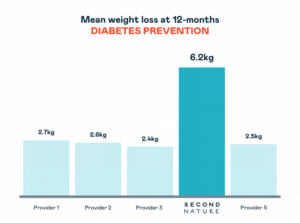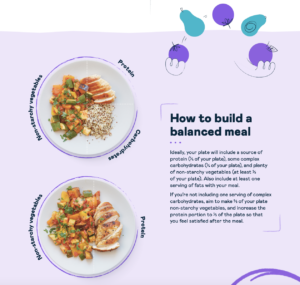Jump to: Weight loss shakes can support rapid weight loss | Are meal replacements better than ‘normal’ diets? | Downsides to severe caloric restriction | Take home message
Weight-loss shakes do work in the short term, as weight loss is a simple equation of consuming fewer calories than your body burns.
Weight loss shakes, or meal replacement diet plans help you create a severe calorie deficit, and if you adhere to the programme, you’ll often experience rapid weight loss in the first 4-12 weeks.
However, weight-loss shake diets are typically very challenging to adhere to due to the low-calorie intake (typically just 900 calories a day) and the lack of enjoyment of food that we experience.
Most of us will simply get bored of only drinking our meals every day for a few weeks, even if we’re seeing significant weight loss.
Weight-loss shake diets rarely address the underlying habits and behaviours that lead to overeating. So, most people will see their weight come back on when they return to eating real food as they’ve not developed the tools required to manage their intake naturally.
What are weight loss shakes?
Weight loss shakes or meal replacements are liquid formulations that often come in the form of milkshakes, soups, or smoothies.
They’re typically low calorie, low sugar, high protein (often in the form of a protein powder like whey protein). They’ll be fortified with essential vitamins and minerals to try and provide your body with a replication of a complete meal.
While they’re typically fortified, it’s sometimes recommended to take supplements (such as multivitamins) alongside them if they don’t contain everything your body needs.
They often come in different flavours using artificial sweeteners. The most popular diet shakes are chocolate or strawberry flavours, and gluten-free options are available for celiacs.
Some may also come with added protein shakes to support the retention of lean mass like muscle and bone.
They’re available in your local supermarket, or purchase complete programmes online.
We’ve a comparison guide looking at two of the most popular meal replacement programmes here.
While meal replacements with shakes, soups, and smoothies can support rapid weight loss in the short term, the issue comes with sustained weight loss.
What will you do once you’ve lost weight?
A wealth of research shows that weight loss can be achieved through many different approaches: weight loss shakes, keto diet, vegan diet, paleo, low-carb, low-fat, or fasting.
If you can create a calorie deficit, you can lose weight. But it’s not about what works in a research setting but what can work for you in the long run.
Despite supporting rapid weight loss initially, strict crash diets often fail because they don’t focus on building sustainable habits for your lifestyle. They focus too much on the ‘what’ while forgetting about the ‘how’ or the ‘why’.
Focus on the long-term
Some research suggests that if you’re more successful at losing more weight initially, you might be more likely to maintain your weight loss in the long run.
In this respect, weight loss shakes and meal replacements could be advantageous for long-term weight loss as they can support rapid weight loss in the first 8-12 weeks.
However, this doesn’t mean that you should look to lose as much weight as quickly as possible by any means necessary.
Without lasting changes to your lifestyle, such as increasing your physical activity and eating a healthier diet, you’ll likely experience weight regain after the initial loss – no matter how quickly you lose weight.
The DiRECT trial is a famous meal replacement study that showed that type 2 diabetes could be put into remission with significant weight loss using weight-loss shakes, soups, and smoothies.
But the intervention was more than the 12 weeks of meal replacements. Patients were provided with support from a registered dietitian or nurse to learn about healthy dietary patterns alongside the re-introduction of whole foods.
So, whether you’re looking for rapid weight loss initially or a more sustainable approach – the key to long-term weight loss is building a healthy lifestyle that will inherently promote a healthy weight.
At Second Nature, you’re provided with the support of a registered dietitian and nutritionist trained in health coaching and behavioural science to help you develop a healthy lifestyle alongside supporting weight loss through diet changes.
Pavlenka’s a member of Second Nature who’s found a sustainable approach to weight loss after regaining much of the three stones she lost on a weight loss shake programme.
Despite losing nearly 20 kgs on a meal replacement diet, she wasn’t supported to make the necessary changes to her lifestyle or mindset alongside this and couldn’t make the weight loss stick.
If you’d like to join over 150,000 others like Pavlenka, who’s made losing weight feel second nature, click here to take our health quiz.
Otherwise, keep reading as we dig into the science behind weight loss shakes and meal replacement diets.
1) Weight loss shakes can support rapid weight loss
Clinical trials have previously shown that using meal replacements as part of a weight-loss diet is as effective as other weight-loss approaches.
A randomised controlled trial on people living with obesity compared the effect of a low-calorie diet with two meals provided as meal replacements (SlimFast) to a standard low-fat/low-calorie diet.
After six months, both groups lost a significant amount of weight. The meal replacement diet group lost 9kg, and the low-calorie diet group 9.2kg.
Unfortunately, this trial had no follow-up beyond six months, so the long-term impact is unclear.
Six months is often the ‘honeymoon’ period in weight loss trials. You typically see the most significant results between 6-12 months, followed by weight regain when individuals are no longer in the confines of the intervention.
This has been demonstrated in more recent trials that have provided longer-term follow-up.
Weight regain beyond 12 months
The DiRECT trial was a large randomised controlled trial with over 300 participants comparing a total dietary replacement (TDR) protocol (where all meals in the first eight weeks are weight loss shakes, soups, or smoothies) to the standard treatment of care.
After 12 months, the participants in the TDR group lost an average of 10.6 kg. In comparison, the control group lost 1.1 kg.
However, after 24 months, there was an average regain of 3 kg in the TDR group – with the final average weight loss at 7.6 kg compared with the control group at 2.3 kg. This is despite the high level of support individuals received during the trial.
Participants had regular sessions with a registered dietitian or nurse and access to a ‘rescue plan’ should they experience weight regain, which included more intensive support to help them continue with their weight loss.
The novel approach of TDR used in the DiRECT trial was used in a follow-up trial called the DROPLET study.
These studies were almost identical in design, but the main difference was that the DROPLET trial utilised private organisations to deliver the programme, compared to DiRECT, which used frontline healthcare staff such as dietitians and nurses.
The results were as expected. After six months, the TDR group lost an average of around 15 kg compared to around 4 kg in the control group.
However, after 12 months, average weight loss fell to around 10 kg, and 6.3 kg after three years. An average regain of around 9 kg between six months and three years.
This regain isn’t necessarily a failure of the interventions. The outcomes observed in these trials are still significant and show that meal replacements can support long-term weight loss with the right support alongside them.
However, the weight regain demonstrates that weight loss shakes and meal replacements aren’t foolproof and that many people struggle with transitioning from meal replacements to improving their eating habits in everyday life.
The real challenge is maintaining weight loss after the intervention period is complete. You can’t live in meal replacements forever (you certainly wouldn’t want to).
Key points:
- Research shows that meal replacement diets can support rapid weight loss, particularly the recently developed protocol of total dietary replacement.
- However, the largest effect is seen within the ‘honeymoon’ up to 6-12 months. After this, weight regain occurs.
- Many people struggle with transitioning from the structure and guidance of interventions to normal life, where barriers to healthy eating are more difficult to overcome.
- However, some people will achieve a successful transition and keep the weight off for good, thus improving their health.
2) Are meal replacement diets better than ‘normal’ diets?
A systematic review and meta-analysis (a study comparing lots of different studies on an outcome) compared meal replacement diets to standard low-calorie diets to determine what was more effective at supporting weight loss and other health indicators.
The study showed that meal replacement diets support more significant weight loss and health markers such as HbA1c (average blood glucose levels) in studies with one, two, and four-year follow-ups.
While this sounds promising for meal replacement diets, it’s essential to understand what it’s being compared against.
In these trials, the comparison diet is typically a low-fat, low-calorie diet based on public health guidelines.
Research has shown that low-fat diets aren’t as effective at supporting weight loss compared to diets higher in fat and lower in carbohydrates.
Additionally, diets higher in fat, such as lower-carbohydrate and Mediterranean diets, have been shown to support more significant improvements in overall health compared to low-fat diets.
So, meal replacement diets with adequate support may help you achieve better weight loss in the short and long term compared to standard low-fat diets.
Still, it’s unclear how they’d compare to other dietary patterns, such as lower-carbohydrate or Mediterranean diets.
At some point, you’ll need to transition to a diet that you can sustain in the long term, whether you choose to lose weight with a meal replacement diet first or not.
So, you need to consider whether the intervention of a strict meal replacement diet for 3-6 months is worth it or whether you’d like to develop a sustainable lifestyle immediately and make weight loss feel easier.
The Second Nature approach: sustainable and effective
In 2022, the NHS published data in the British Medical Journal from the National Weight Management and Diabetes Prevention programme, where five providers delivered weight loss services in the UK.
The results showed that after 12 months, Second Nature was more than twice as effective as the four other providers.

How does Second Nature’s approach work?
We approach nutrition and healthy eating differently. We don’t count calories, track macros, weigh food, or ask you to go on a strict crash diet to lose weight fast.
We provide you with evidence-based guidance on a balanced diet and teach you to understand what your physical and emotional drivers for eating are to reach your weight loss goals.

We also provide tools, such as our hunger scale and mindful eating techniques, that help you tune into your physical hunger cues and manage your food choices.
Alongside this, we help you build healthy habits that you can enjoy for a lifetime to help you maintain a healthy weight.
Our feedback inbox is filled with people like Jo, who lost over eight stone to achieve a healthy body weight on Second Nature after following our nutrition guidelines and receiving the support of our app and health coaches.
The difference is that members of Second Nature learn to love food again. They’re no longer restricted; they’re liberated.
Key points:
- Research has shown that meal replacement interventions support weight loss more than traditional low-fat diets.
- However, low-fat diets are less effective at supporting weight loss compared to other diets higher in fat – so it’s unclear how meal replacements would compare.
- Second Nature’s approach is less restrictive than meal replacement diets, and evidence published in the BMJ suggests it’s more effective than other weight loss diets.
3) Downsides to severe caloric restriction
Beyond meal replacement diets, there are downsides to severe caloric restriction that you need to consider before trying a weight loss shake diet.
Lean mass retention
Your lean mass comprises your bones, skin, and other vital organs. As we age, it becomes more challenging to retain our lean body mass, which is essential for our health.
Typically, the greater our level of lean mass relative to our total body weight, the healthier we are, as lean tissue is more metabolically active than fat mass (it burns more energy to maintain).
A randomised controlled trial in 101 postmenopausal women compared a severe calorie-restriction diet to a moderate diet.
The results showed that the severe calorie restriction group lost twice as much weight as the moderate group.
However, the severe caloric restriction group also lost 1.5 times more lean mass relative to their weight loss and 2.5 times more bone mineral density from their hip.
Another interesting observation from this study is that while the severe calorie restriction group started to experience weight regain after six months, the moderate group continued to lose and maintain their weight loss for up to 12 months.
Weight loss maintenance
One of the potential issues with severe caloric restriction is the ‘rebound effect’. The brain constantly senses how much energy you’re taking in and how much fat is stored in the body.
When you dramatically cut your calorie intake and your body fat decreases, your brain will trigger a starvation response, technically termed metabolic adaptation or adaptive thermogenesis.
The starvation response will lower your metabolism and increase your desire to eat. You might feel hungry, lethargic, and unsatisfied with your meals as your brain tries to encourage the return of the fat lost during weight loss.
This is one of the reasons we see weight regain after six months of weight loss and diet interventions.
However, losing weight slowly and more sustainably may prevent such a dramatic response from your brain and allow you to continue to lose weight in the long term.
A randomised pilot study in 46 men compared a 10% calorie-restricted diet to 30% to determine their impact on weight loss.
Unsurprisingly, the 30% calorie-restricted diet achieved more weight loss on average after six months.
However, after 12 months, there was no significant difference between the two groups, where they both lost around 8% of their weight on average.
Additionally, while the 30% calorie-restricted group saw weight regain between 6-12 months, the 10% group maintained their weight loss and continued to lose small amounts of weight as the study progressed.
There are ways to support weight loss maintenance after rapid weight loss using diet shakes.
A randomised controlled trial in 256 participants found that a high-protein diet following an 8-week low-calorie diet led to more sustained weight loss and better health improvements than a lower-protein diet.
Fertility
Research has shown that when females restrict their calorie intake too severely, it can harm their menstrual cycle and lead to infertility.
Fortunately, studies have shown this can be reversed when women return to eating enough energy (calories) – but the long-term effects of severe caloric restriction on fertility are not fully understood.
So, suppose you’re looking to conceive or aren’t comfortable with your menstrual cycle being negatively affected. In that case, trying a very low-calorie diet might not be recommended to try and lose weight.
Key points:
- Research shows that very-low-calorie diets might lead to reduced lean mass and bone mineral density compared to more moderately restricted diets.
- Very strict diets also tend to have more of a ‘rebound effect’ where weight regain is observed after six months, whereas moderately restricted diets don’t tend to see the same effect.
- Low-calorie intake can negatively impact fertility. So, if you’re looking to conceive, it’s not advisable to drastically cut your calorie intake.
Take home message
Weight loss shakes and meal replacement programmes do work. Research shows they can lead to significant weight loss, which is often better than the standard interventions often offered in primary care.
Studies showing that meal replacement shakes support weight loss also provide intensive behavioural support and guidance on transitioning to a whole-food diet to maintain weight loss.
Despite this, meal replacement diets often show many of the same pitfalls of other low-calorie diets where weight regain is often observed.
Some people can push through the strict intervention of a meal replacement programme and maintain their weight loss in the long term. For them, the ends will justify the means.
However, for many others, meal replacement diets will be just another diet to add to the list of many that have failed for them in the past, despite their best efforts.
In this case, more sustainable approaches like Second Nature might be a better choice for you.
If you’d like to see what it feels like to make weight loss feel easier with balanced meals that reduce your cravings, balance your blood sugar, and come packed with all the essential amino acids to support your lean mass, try our NHS-trusted meal plan here.






